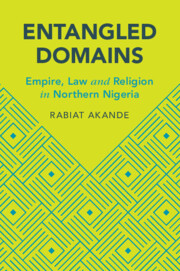Book contents
- Entangled Domains
- Cambridge Studies in Law and Society
- Entangled Domains
- Copyright page
- Dedication
- Contents
- Acknowledgments
- Note on Terms
- Introduction
- Part I Governing Faith
- Part II Constituting Difference
- Part III Imagining the Past
- Chapter Six The 1977 Constitutional Conference and Beyond
- Conclusion
- Bibliography
- Index
- Cambridge Studies in Law and Society
Conclusion
from Part III - Imagining the Past
Published online by Cambridge University Press: 18 May 2023
- Entangled Domains
- Cambridge Studies in Law and Society
- Entangled Domains
- Copyright page
- Dedication
- Contents
- Acknowledgments
- Note on Terms
- Introduction
- Part I Governing Faith
- Part II Constituting Difference
- Part III Imagining the Past
- Chapter Six The 1977 Constitutional Conference and Beyond
- Conclusion
- Bibliography
- Index
- Cambridge Studies in Law and Society
Summary
Empire’s embrace of secular governmentality called for a rhetoric of state separation from religion. At the same time, however, the state’s promise of religious autonomy and the ideological underpinnings and administrative exigencies of indirect rule translated into the co-option, regulation, and transformation of religion and religious institutions. In the end, therefore, imperial secular governmentality–in its varied spatial and temporal manifestations–entailed an uneasy truce between the rhetoric of state-religion separation, and the everyday intimacy of religion and state authority. The conclusion argues that that paradox is central to the law and politics of the modern state’s governance of religious difference.
Keywords
- Type
- Chapter
- Information
- Entangled DomainsEmpire, Law and Religion in Northern Nigeria, pp. 267 - 273Publisher: Cambridge University PressPrint publication year: 2023

